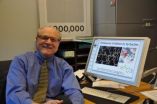Mushroom-supplemented soybean extract shows therapeutic promise for advanced prostate cancer
2013-02-20
(Press-News.org) (SACRAMENTO, Calif.) — A natural, nontoxic product called genistein-combined polysaccharide, or GCP, which is commercially available in health stores, could help lengthen the life expectancy of certain prostate cancer patients, UC Davis researchers have found.
Paramita GhoshMen with prostate cancer that has spread to other parts of the body, known as metastatic cancer, and who have had their testosterone lowered with drug therapy are most likely to benefit. The study, recently published in Endocrine-Related Cancer, was conducted in prostate cancer cells and in mice.
Lowering of testosterone, also known as androgen-deprivation therapy, has long been the standard of care for patients with metastatic prostate cancer, but life expectancies vary widely for those who undergo this treatment. Testosterone is an androgen, the generic term for any compound that stimulates or controls development and maintenance of male characteristics by binding to androgen receptors.
The current findings hold promise for GCP therapy as a way to extend life expectancy of patients with low response to androgen-deprivation therapy.
Paramita Ghosh, an associate professor in the UC Davis School of Medicine, led the pre-clinical study with a team that included UC Davis Comprehensive Cancer Center Director Ralph de Vere White, a UC Davis distinguished professor of urology. Ruth Vinall in the UC Davis Department of Urology and Clifford Tepper in the UC Davis Department of Biochemistry and Molecular Medicine directed the studies in mice; Ghosh's laboratory conducted the cell studies.
The research focused on GCP, a proprietary extract cultured from soybeans and shiitake mushrooms and marketed by Amino-Up of Sapporo, Japan. Researchers found that the combination of the compounds genistein and daidzein, both present in GCP, helps block a key mechanism used by prostate cancer cells to survive in the face of testosterone deprivation.
The research team had earlier shown that when a patient's androgen level goes down, cancerous prostate cells kick out a protein known as filamin A, which is otherwise attached to the androgen receptor in the cell's nucleus. The androgen receptor regulates growth of prostate cancer cells. Once filamin A leaves the cancerous cell's nucleus, that cell no longer requires androgens to survive. Thus, loss of filamin A allows these cells to survive androgen deprivation, at and the cancer essentially becomes incurable.
The paper, titled "Enhancing the effectiveness of androgen deprivation in prostate cancer by inducing Filamin A nuclear localization," shows for the first time that GCP keeps filamin A in the nucleus. As long as this protein remains attached to the androgen receptor, the cancerous cells need androgens to survive and grow. They die off when starved of androgens, thus prolonging the effects of androgen deprivation, which ultimately prolongs the patient's life.
The team's hypothesis is that metastatic prostate cancer patients with the weakest response to androgen-deprivation therapy could be given GCP concurrently with androgen deprivation therapy to retain Filamin A in the nucleus, thereby allowing cancer cells to die off.
De Vere White is now pursuing funding to begin GCP human clinical trials. Because GCP is a natural product rather than a drug, and requires fewer government approvals, it's expected that these trials will proceed rapidly once funded.
"We should know within the first eight months or so of human clinical trials if GCP works to reduce PSA levels," says de Vere White, referring to prostate-specific antigen levels, a tumor marker to detect cancer. "We want to see up to 75 percent of metastatic prostate cancer patients lower their PSA levels, and GCP holds promise of accomplishing this goal. If that happens, it would probably be a greater therapy than any drug today."
###
The research was supported by a Biomedical Laboratory Research and Development service Merit Award (I01BX000400) from the Department of Veterans Affairs and by R01CA133209 from the National Cancer Institute.
Other authors were Benjamin A. Mooso, Sheetal Singh, Salma Siddiqui, and Maria Mudryj of the VA Northern California Health Care System; Ruth L. Vinall, Rosalinda M. Savoy, Jean P. Cheung, and Yu Wang of the UC Davis Department of Urology; Clifford G. Tepper, Anthony Martinez, and Hsing-Jien Kung of the UC Davis Department of Biochemistry and Molecular Medicine; and Roble G. Bedolla of the University of Texas Health Science Center at San Antonio.
UC Davis Comprehensive Cancer Center is the only National Cancer Institute-designated center serving the Central Valley and inland Northern California, a region of more than 6 million people. Its specialists provide compassionate, comprehensive care for more than 9,000 adults and children every year, and access to more than 150 clinical trials at any given time. Its innovative research program engages more than 280 scientists at UC Davis, Lawrence Livermore National Laboratory and Jackson Laboratory (JAX West), whose scientific partnerships advance discovery of new tools to diagnose and treat cancer. Through the Cancer Care Network, UC Davis collaborates with a number of hospitals and clinical centers throughout the Central Valley and Northern California regions to offer the latest cancer care. Its community-based outreach and education programs address disparities in cancer outcomes across diverse populations. For more information, visit http://cancer.ucdavis.edu.
ELSE PRESS RELEASES FROM THIS DATE:
Power connects decision makers to the future
2013-02-20
Decision makers who feel powerful and in control of resources are more likely than others to make decisions that will benefit their future selves, according to researchers at the USC Marshall School of Business.
Conversely, those who lack feelings of power tend to prefer smaller immediate gains – those that benefit the present self – to potentially greater benefits in the future, according to "Power and Reduced Temporal Discounting," a research paper by Nathanael Fast, an assistant professor of management and organization at and Priyanka Joshi, a doctoral candidate ...
International space station plays host to innovative infectious disease research
2013-02-20
Performing sensitive biological experiments is always a delicate affair. Few researchers, however, contend with the challenges faced by Cheryl Nickerson, whose working laboratory aboard the International Space Station (ISS) is located hundreds of miles above the Earth, traveling at some 17,000 miles per hour.
Nickerson, a microbiologist at Arizona State University's Biodesign Institute, is using the ISS platform to pursue new research into the effects of microgravity on disease-causing organisms.
Nickerson presented her research findings and charted the course for ...
UCLA study suggests link between untreated depression, response to shingles vaccine
2013-02-20
Can an individual's state of mind effect how well a vaccine may work? In the case of seniors and shingles, the answer is yes.
Reporting in the current online edition of the journal Clinical Infectious Diseases, Dr. Michael Irwin, a professor of psychiatry at the Semel Institute for Neuroscience and Human Behavior at UCLA, demonstrates a link between untreated depression in older adults and decreased effectiveness of the herpes zoster —or shingles — vaccine.
Shingles is a painful, blistering skin rash that can last for months or even years. It's caused by the varicella–zoster ...
BUSM authors propose potential epigenetic mechanisms for improved cancer therapy
2013-02-20
(Boston) – A review article by researchers at Boston University School of Medicine (BUSM) proposes a new epigenetic hypothesis linked to tumor production and novel ideas about what causes progenitor cells to develop into cancer cells. Published in the February 2013 issue of Epigenomics, the article provides examples of how epigenetic drug treatments could be beneficial in treating cancers while also decreasing the likelihood of cancer relapse.
The article was written by researchers at the Boston University Cancer Center. Sibaji Sarkar, PhD, adjunct instructor of medicine ...
Infants in poverty show different physiological vulnerabilities to the care-giving environment
2013-02-20
Some infants raised in poverty exhibit physical traits that make them more vulnerable to poor caregiving, according to new research published in Psychological Science, a journal of the Association for Psychological Science. The combination of physiological vulnerability and poor caregiving may lead these children to show increased problem behaviors later in childhood.
For infants growing up in poverty, the ability to adapt and regulate — both biologically and behaviorally — in response to various environmental pressures seems to be critical for successful development.
To ...
Rewriting a receptor's role
2013-02-20
In a pair of new papers, researchers at the University of California, San Diego School of Medicine and the Royal Netherlands Academy of Arts and Sciences upend a long-held view about the basic functioning of a key receptor molecule involved in signaling between neurons, and describe how a compound linked to Alzheimer's disease impacts that receptor and weakens synaptic connections between brain cells.
The findings are published in the Feb. 18 early edition of the Proceedings of the National Academy of Sciences.
Long the object of study, the NMDA receptor is located ...
IU research: Rock-paper-scissors a parable for cycles in finance, fashion, politics and more
2013-02-20
BLOOMINGTON, Ind. -- Using a grown-up version of the rock-paper-scissors game, Indiana University cognitive scientists offer a new theory of the group dynamics that arise in situations as varied as cycles of fashion, fluctuations of financial markets, eBay bidding wars and political campaign strategies.
In a study written about this week in PLOS ONE, the researchers analyzed situations in which each person's decision depends on what they think other people will decide, looking at the riddle of "what you think I think you think I think."
What they found, said Seth Frey, ...
New compound holds high promise in battling kidney cancer
2013-02-20
RIVERSIDE, Calif. — Chemists at the University of California, Riverside have developed a compound that holds much promise in the laboratory in fighting renal (kidney) cancer.
Named TIR-199, the compound targets the "proteasome," a cellular complex in kidney cancer cells, similar to the way the drug bortezomib, approved by the Food and Drug Administration, targets and inhibits the proteasome in multiple myeloma cells, a cancer coming from bone marrow.
Michael Pirrung, a distinguished professor of chemistry at UC Riverside, announced the development of TIR-199 in a lecture ...
Diagnosis and treatment now possible for osteoarthritic cats
2013-02-20
VIDEO:
Scientists at the University of Montreal's Quebec Research Group in Animal Pharmacology have found a way to recognize and treat osteoarthritis in cats -- a condition that the owner might...
Click here for more information.
Scientists at the University of Montreal's Quebec Research Group in Animal Pharmacology have found a way to recognize and treat osteoarthritis in cats – a condition that the owner might not notice and that can make even petting painful. "Osteoarthritis ...
Stanford researchers develop tool for reading the minds of mice
2013-02-20
If you want to read a mouse's mind, it takes some fluorescent protein and a tiny microscope implanted in the rodent's head.
Stanford scientists have demonstrated a technique for observing hundreds of neurons firing in the brain of a live mouse, in real time, and have linked that activity to long-term information storage. The unprecedented work could provide a useful tool for studying new therapies for neurodegenerative diseases such as Alzheimer's.
The researchers first used a gene therapy approach to cause the mouse's neurons to express a green fluorescent protein ...



